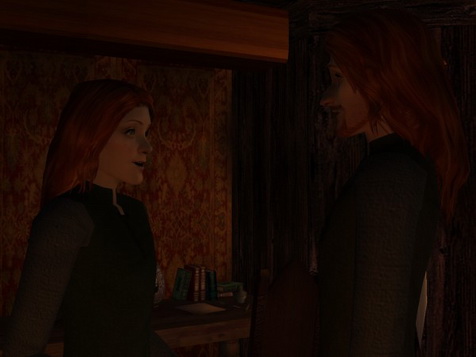
“The first thing we’re going to do is light some candles,” Brinstan announced. “I can’t tell which of us is I in here, in this light.”
His father chuckled sheepishly. “We hadn’t meant to stay long…”
“Nor shall we, but I haven’t seen you in so long I should like to see you now.”
His father did not reply.

As he lit the candles on the desk, Brinstan noticed that his father had taken out a clean sheet of parchment, but he had not written a word. Since then it had grown dingy with a several days’ dusting of crinkly soot, and the desk was dark with a thick layer of it. Even the candles had remained unlit a while, and the black flakes floated for a moment atop the pool of softening wax until it had melted enough to let them sink away.
He went next to the candles in the alcove, and his father followed, suddenly grinning.
“How’s your grandfather?” he asked, with a strained cheerfulness. “I shall stop and visit him a while.”
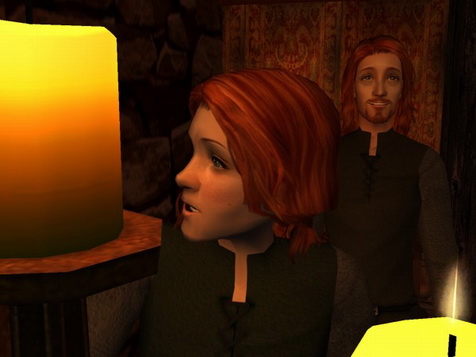
“Same as ever,” Brinstan said. “Still stomps all the way around the park twice a day with his damned yapping dogs at his heels – and he always makes me come with him, rain or snow or shine.”
“He’s been sixty years old since he was sixty years old,” his father laughed. “I would swear he hasn’t aged a day in twenty years.”
Brinstan thought his father had aged twenty years in six months, but he said nothing as yet.
“I shall go visit with him a while,” his father repeated limply.

Brinstan shook out the flame on the tip of the rush and dropped it onto the stones.
His father had always lamented his inability to visit his elderly father-in-law more often, but Brinstan had thought it more the creaking of a guilty conscience than any real desire to make the journey. His father had never insisted before.
“Why don’t you ride that far with me when I go back to Hamelan?” Brinstan suggested.
His father laughed shakily. “Well, that’s what I meant to say, Brin. You won’t be going back to Hamelan for a while. I need you here.”

“What’s this about?” Brinstan asked, speaking softly to hide his unease. “What was ‘not urgently but do not tarry long’ supposed to mean, anyway? I didn’t dare spend more than a night with Grandfather.”
“I need you here, Brin. I need… You see, I’m going away for a while.”
“Going where?” Brinstan asked coolly. He did not yet have enough information to fly into a rage. Nevertheless every beat of his heart seemed to be thumping out “Osfrey… Osfrey… Osfrey…”
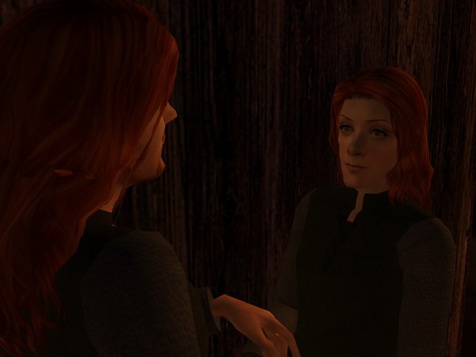
“Well, I’m going on a pilgrimage.” His father’s smile was perhaps intended to be sweet, perhaps even beatific, but to Brinstan it appeared sickly and sick. “To Winchester,” he added softly.
That was information enough.
“Winchester!” Brinstan threw out his arms, slapping his palms against the walls of the alcove as if he could block his father’s way to the world. “Win–chester! Now?”
“Well – ”
“That Winchester? That’s hundreds of miles away! In the winter!”
“It has been a very mild winter…” his father protested feebly.
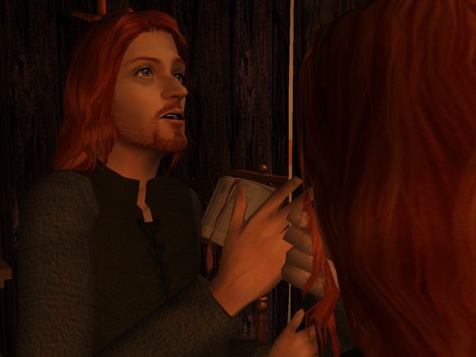
“Whose idea was this? Sit down, first of all – ”
Brinstan yanked back his father’s chair to bid him sit. Only then did he notice that his father had been sitting on a plain, hard chair, and Osfrey in the big chair with arms and cushions.
“Over here!” he cried, shuffling his docile father along to the other chair.
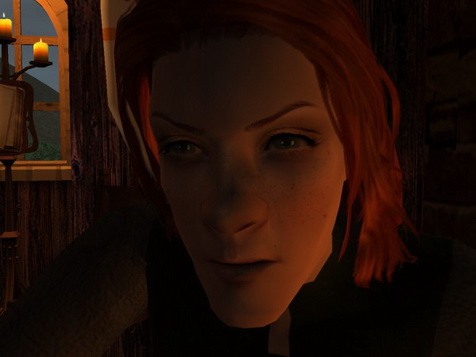
“Brin…”
Brinstan sat in the first chair and roughly scooted it across the floor, but he stopped sharply before his knees bumped into his father’s – “in time,” he thought to himself.
And then he thought of the sturdy legs of the father he remembered from a year before – when he, only one year younger, had still been boyish enough to sling himself across his father’s lap and wrestle with him and tickle him until they were both out of breath from too much healthy laughter.
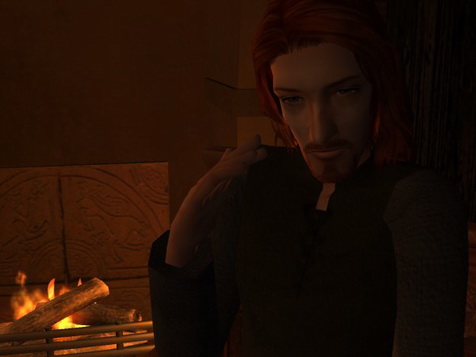
Now Brinstan found himself treating his father with the same solicitude he had shown his eighty-six-year-old grandfather that morning. Brinstan was not even certain his father would have had the strength to go “stomping all the way around the park” with the old man.
“Father,” he smiled, suddenly overcome with an awkward tenderness, “in times past I seem to recall you complaining about no more than a walk across the court to go to chapel, if it was raining or snowing.”

“It’s not the same,” his father murmured.
“No,” Brinstan sighed with a teasing weariness, “because the chapel is across the court and Winchester is three hundred miles away.”
“No, Brin, because it’s a pilgrimage…” his father explained with a quiet patience that seemed born of exhaustion. “It’s penitence.…”
“It’s suicide!” Brinstan cried. “Can’t it wait till spring? Whose idea…”
His father’s reaction was startling in its intensity: a long, guttural moan that Brinstan realized only afterwards was meant to be the word “No!”
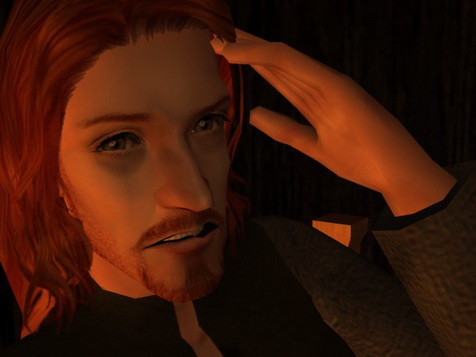
Brinstan’s question died on his tongue. His father was still his father, still Baron, could still command him with a word. However, his father the Baron only surfaced for the space of that word, and he sank away at once like a flake of soot into molten wax.
“I cannot wait any longer,” his father whimpered like a child. “Brin…”
Brinstan grasped the thin hands his father wrung, gently separated them, and laid them side-by-side upon his lap. “I don’t think you have to do it at all,” he grumbled as he straightened them. “I don’t know what you’ve done, but penitence is supposed to be matched to the strength of the penitent.”
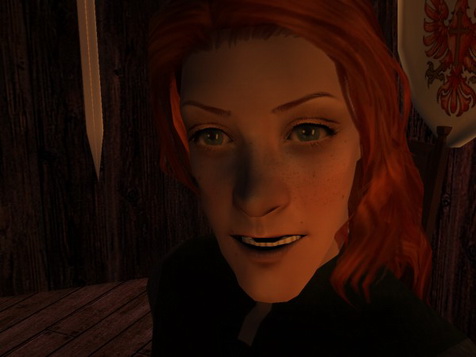
His father whispered a hoarse, “No…”
“Perhaps you haven’t noticed the change, but I’ve been away half a year. You were never much to look at, old mule, but – forgive me, but you look ill. Frankly, you look like hell. You – ”
Again Brinstan was silenced by his father’s moan. “Don’t say that!” he snarled.
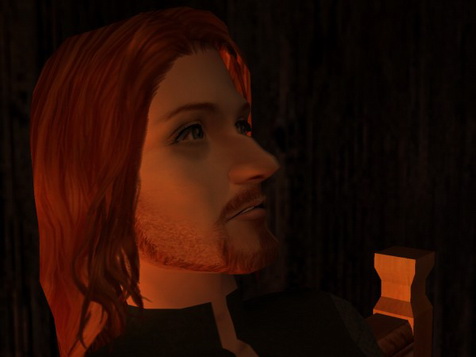
“Say – what?” Brinstan whispered.
“Hell! You don’t know what it is!”
Brinstan scarcely dared breathe.
His father jerkily wiped his mouth with the back of his hand. “I’m not sick, Brin,” he muttered, as though embarrassed by his outburst. “I’ve not slept in days. Not since the new moon.”
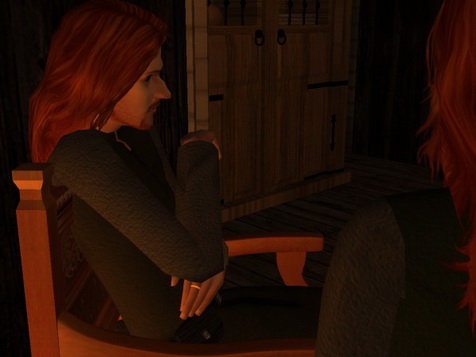
Brinstan sighed and sank back against the chair. The moon.
“I dare not,” his father said softly. “The dreams…”
“The dreams,” Brinstan whispered bitterly to himself.
“What is Hell?” his father asked. He answered: “Never-ending torment. Hours and hours of torture, Brinstan – until I die, or seem to die. It breaks my fingers and breaks my arms, and it rips out my tongue, and pokes out my eyes, and scrapes the skin off my back – ”
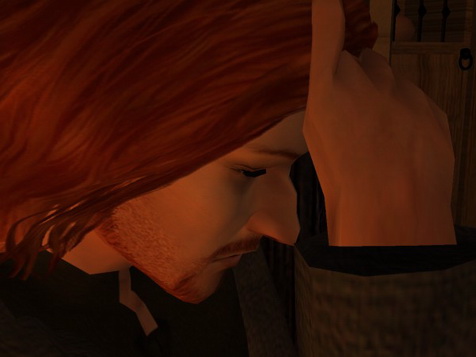
“Father!”
“And the blood!” he whimpered. “And the agony! Until I die. And then I wake up in my bed. But it starts again the next time I sleep,” he said pleadingly.
He leaned closer to whisper, and his hands crept off of his own lap and crawled onto Brinstan’s.
“I wake up,” he gibbered, “all broken and bloody, and try to crawl away, but it finds me, and it starts again. Every night, until I am so mangled I can’t move or even feel the pain any longer. And then I sleep silently for a few nights, and then…”
The shaking fingers clenched around Brinstan’s leg, biting into the muscles of his thighs, until Brinstan laid his own hands upon them, and they calmed.

“The new moon,” his father whispered hoarsely. “I awake whole and alive and it begins again.”
His father sat up suddenly and pulled his hands free of Brinstan’s grasp to hide his face behind them.
“I am already halfway to Hell, Brinstan,” he said with a voice drained hollow. “I spend my nights there already.”
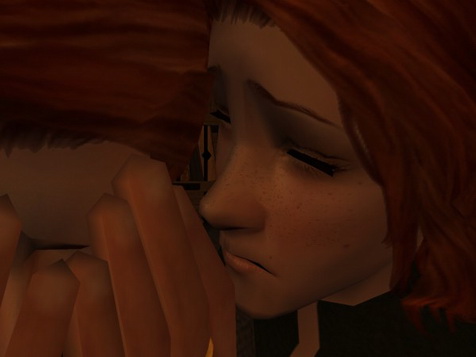
“They’re only dreams,” Brinstan murmured.
“Only dreams!” his father moaned, and then he sat back and laughed weirdly. “That’s what everybody says! What does it matter, if they seem real? Would you endure torture night after night so long as the wounds disappeared in the morning?”
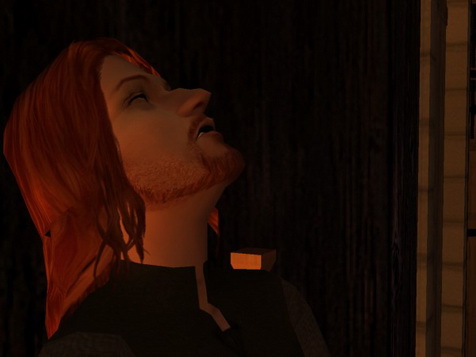
Brinstan did not know how to answer that.
“I don’t even know what’s real and what’s a dream,” his father whimpered. “Perhaps I’m already dead. Perhaps part of Hell is spending time in something like life every day, seeing the people we love, to remind us what we’ve lost…”
Brinstan grabbed both of his father’s hands by the wrists and squeezed. “Now stop right there,” he said. “I happen to know you’re just as alive as I am. And I’m the alivest boy I ever saw!”
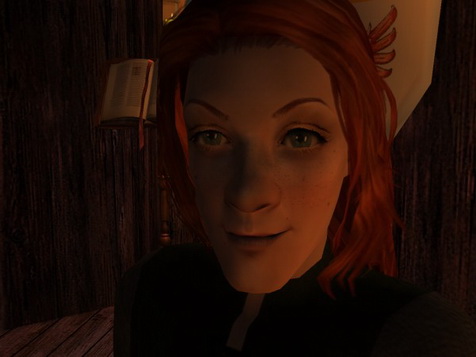
His father laughed painfully. “That you are! God bless you, Brin.”
He gently slapped Brinstan’s cheek like a father, and then stroked it with his thumb, like a mother. His hand was as long as ever, Brinstan thought, but thin and cold. Brinstan grabbed it and kissed it.
His father said, “You’ve your mother’s eyes and your mother’s nose – and by God, sometimes I swear you say just what she would have said. ‘The alivest boy!’” he chuckled softly to himself.

“So let me stay with you a while,” Brinstan said. “Nothing like a dose of Alivest Boy to cure you.”
“No, Brin.” Though his smile faded he remained calm. “I must do this. I have tried everything else – praying, fasting, exorcism…”
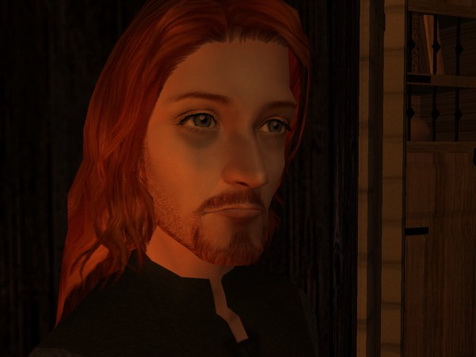
“Exorcism!” Brinstan gasped.
“If this doesn’t help, I don’t know what I shall do,” his father said shakily. “I believe I shall enter a monastery. I can no longer rule.”
They sat in such deep silence that Brinstan could hear his heart’s pounding. He could not tell what it was saying – no longer a name, quite – perhaps “Orphan… orphan… orphan…”

“Don’t worry, Brin,” his father said, gathering up enough courage to force another smile. “I think I shall sleep easier just knowing you are here – Alivest Boy of mine!” His father stroked his cheek again with his cold palm. “You know I was never meant to be Baron. You have been raised to rule, and you have your mother’s cool head beneath my fiery hair. You will do better than I.”

“But that… wasn’t what…” Brinstan protested in stunned confusion.
“And you will be spared this,” his father whispered earnestly. “It is written: ‘Unto the third and to the fourth generation.’ You and your children will be spared, Brinstan. It ends with me.”
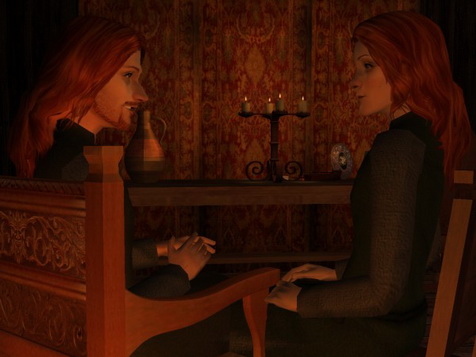





Brinstan has a great heart, but god damn he's unfortunate looking.
I hope the Barron finds peace, is Hel his great grandmother?